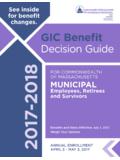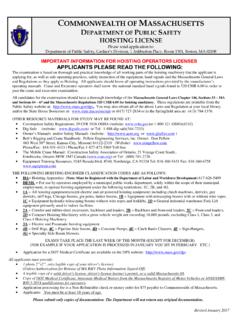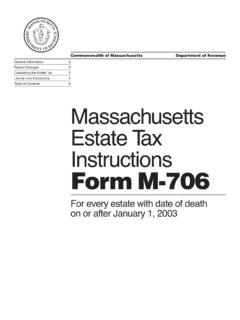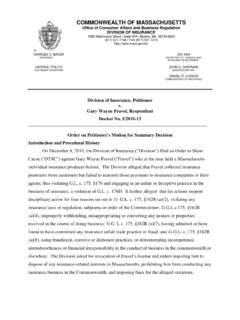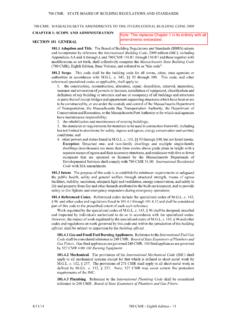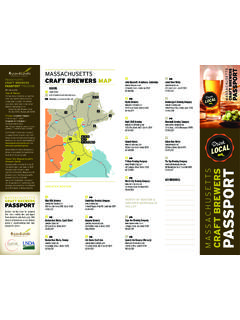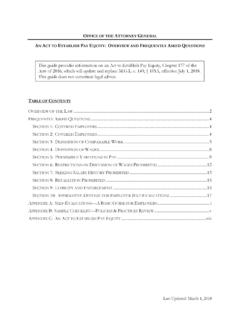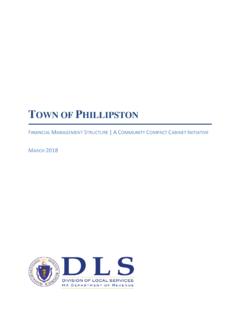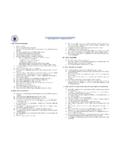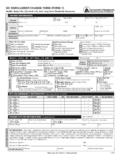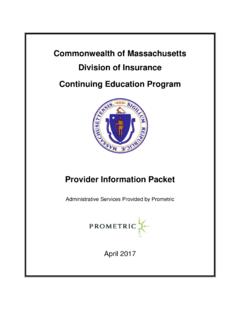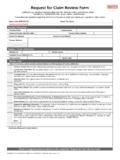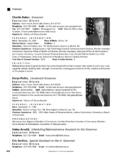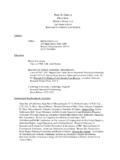Transcription of The Commonwealth of Massachusetts
1 The Commonwealth of Massachusetts AUDITOR OF THE Commonwealth ONE ASHBURTON PLACE, ROOM 1819 BOSTON, Massachusetts 02108 A. JOSEPH DeNUCCI AUDITOR TEL. (617) 727-6200 NO. 2009-4478-3C INDEPENDENT STATE AUDITOR S REPORT ON CERTAIN ACTIVITIES OF GROW ASSOCIATES, INC JULY 1, 2006 TO MAY 1, 2009 OOFFFFIICCIIAALL AAUUDDIITT RREEPPOORRTT AAPPRRIILL 2266,, 22001100 2009-4478-3C TABLE OF CONTENTS/EXECUTIVE SUMMARY TABLE OF CONTENTS/EXECUTIVE SUMMARY INTRODUCTION 1 GROW Associates, Inc. (GROW) was organized in Massachusetts on November 9, 1973 as a charitable nonprofit organization under the name of the Randolph Occupational Workshop, Inc. The agency was formed by a group of parents to provide continuing education, occupational training, and extended employment for individuals with developmental disabilities who cannot function independently in the employment market. On November 15, 1996, the agency changed its name to GROW.
2 Currently, GROW operates three programs (Employment Support, Community Based Day Support, and Day Habilitation) designed to teach a variety of job-related skills to more than 140 adults and adolescents with developmental disabilities residing primarily in southern Massachusetts . The scope of our audit was to examine various administrative and operational activities of GROW during the period July 1, 2006 to May 1, 2009. Our audit objectives consisted of the following: Conduct a follow-up review of the issues identified during our prior audit of GROW (No. 2004-4478-3C) to determine what corrective measures GROW had taken to address the problems we identified during this audit Determine whether GROW had implemented effective internal controls over all aspects of its operations Assess GROW s business practices and its compliance with applicable laws, rules, and regulations, as well as the various fiscal and programmatic requirements of its state contracts.
3 During our audit, we determined that GROW had adequately resolved all but one of the issues we identified during our prior audit and was taking measures to fully address the remaining issue. However, during our current audit period, GROW inappropriately allocated as much as $177,797 in administrative compensation to two of its state-funded programs, misreported $80,000 in program revenues, charged $8,409 in unallowable expenses against its state contracts, and charged $2,364 in unallowable late payments against its state contracts. We also found several instances in which GROW s principal state funding agency, the Department of Developmental Services (DDS), provided funding to GROW through questionable contract amendments. These amendments allowed GROW to receive approximately the same level of funding from DDS during the audit period even though GROW provided services to almost 25% fewer consumers than it agreed to under the contracts.
4 We also found that during fiscal year 2008, DDS provided GROW with an additional $20,000 under the contract that funded its Community Based Day Support program that was not related to the services being provided under this program and did not take measures to ensure that these funds were expended for their intended purposes. i 2009-4478-3C TABLE OF CONTENTS/EXECUTIVE SUMMARY AUDIT RESULTS 5 1. PRIOR AUDIT RESULTS RESOLVED 5 a. Unallowable Salary Expenses Totaling $28,830 Reimbursed to the Commonwealth 5 During our prior audit, we found that GROW billed its state contracts for $72,075 in salary and related expenses for its former Executive Director to function as a full-time employee of GROW. However, during this time period the former Executive Director was also being paid as a part-time employee of the Town of Randolph School Department. We calculated that, as a result of this arrangement, $28,830 of the compensation expenses billed by GROW against its state contracts during this fiscal year for its former Executive Director represented unallowable billings that should be remitted to the Commonwealth .
5 During our follow-up review, we found that GROW had reimbursed the Commonwealth for the unallowable salary expenses in question. Further, we determined that GROW s current Executive Director works full-time at GROW and has no other employment commitments during the time he is working at GROW. b. Internal Controls over State Contract Revenue Improved 5 Our prior audit noted that GROW had not established an adequate system of internal controls over its state contract revenue to ensure that it is properly recorded and reported. Specifically, GROW did not have any written policies or procedures relative to the recording of revenue, and rather than recording the actual reimbursements it received from state agencies as state contract revenue, GROW simply recorded the amounts it billed to state agencies as the revenue it actually received in its financial records. As a result, during fiscal year 2003, GROW overstated the state revenue it received in the financial report it submitted to the Commonwealth by $75,016.
6 During our follow-up review, we determined that GROW has improved its internal controls in this area and is correctly recording and reporting its revenue. c. Internal Controls over Employee Fringe Benefits Improved 6 Our prior audit noted that during fiscal years 2002 and 2003, GROW awarded fringe benefits totaling $10,401 to certain members of its administrative staff that were not available to all staff members under GROW s formal written personnel policies and procedures. These benefits included $3,849 in fully paid family health care to GROW s Executive Director and $6,552 in extra vacation time provided to GROW s Executive Director and Assistant Executive Director/Program Director. Fringe benefits such as these that are not available to all employees under an established formal written policy are nonreimbursable expenses under state contracts. During our follow-up review, we found that GROW had reimbursed the Commonwealth for the unallowable fringe benefit expenses in question.
7 We also found that all the benefits that were being provided to staff during out audit period were consistent with agency policies and procedures. ii 2009-4478-3C TABLE OF CONTENTS/EXECUTIVE SUMMARY d. Administrative and Internal Controls over Various Agency Operations Improved 6 Our prior audit noted that GROW had not developed and implemented an adequate system of internal controls over various aspects of its operations. Specifically, GROW had no written accounting policies and procedures or an accounting manual to ensure the accuracy of its financial transactions, reports, and recordkeeping. As a result, there was inadequate assurance that GROW s financial assets and Commonwealth funds were being properly safeguarded or that transactions relative to these accounts were properly authorized, recorded, and reported. During our follow-up review, we determined that GROW has established formal written policies and procedures over various key activities and has developed a written accounting manual that addresses its financial transactions, reports, and recordkeeping.
8 2. PRIOR AUDIT RESULT PARTIALLY RESOLVED - INTERNAL CONTROLS OVER ALLOCATION OF STAFF WAGE EXPENSES NEED IMPROVEMENT 6 Our prior audit revealed that GROW had not established adequate controls over the allocation of wages paid to its employees as required by state regulations and the terms and conditions of its state contracts. Specifically, GROW did not require its salaried staff to document the hours worked or the functions benefited ( , specific program, cost center) and did not follow its own policies and procedures to document non-exempt staff hours charged to state programs. Moreover, for three members of GROW s administrative staff (the Executive Director, Assistant Executive Director, and Business Manager), we found that there were no time sheets to document the hours worked or the programs benefited by these individuals. For other staff members, time records were incomplete ( , indicated an arrival time but not a departure time and were not signed by the staff person s supervisor).
9 As a result, there was inadequate assurance that all of the $1,465,897 in wages paid to GROW s employees and allocated against state contracts during our audit period was accurate. During our follow-up review, we found that GROW has implemented a time sheet reporting system that requires employees to document the hours they work, the program or function benefited, and the signatures of both the employee and their supervisor. We tested all 64 timesheets submitted by 10 of the 41 employees working at GROW during the months of June 2007, February 2008, and April 2009, including GROW s Executive Director, Business Manager, Office Administrator, Community and Vocational Program Directors, and several program staff. Our review revealed that all employees filled out the required timesheets; however, in some instances, time records were incomplete. 3. AS MUCH AS $177,797 IN ADMINISTRATIVE COMPENSATION INAPPROPRIATELY ALLOCATED TO TWO STATE-FUNDED PROGRAMS 8 We found that during our audit period, GROW charged $177,797 of the salary expenses of three of its administrative employees (its Executive Director, Office Administrator, and Receptionist) directly to two of its state-funded programs instead of allocating these expenses across all of its programs as required by state guidelines.
10 Since there was no documentation to substantiate that these three individuals actually worked directly in these two programs, these charges resulted in GROW s misreporting various information in the financial reports that it filed with the Commonwealth during fiscal years 2007 and iii 2009-4478-3C TABLE OF CONTENTS/EXECUTIVE SUMMARY 2008. Specifically, these incorrect charges resulted in GROW s overstating in its financial reports the actual level of staffing it provided in these two programs, as well as the actual salary expenses it incurred in these program, by as much as $177,797. GROW also understated the percentage of its total funding that it spends on administrative costs versus program services. The information in GROW s financial statements is used by state agencies and others to assess various aspects of GROW s operation and performance and is also used by GROW s state funding agencies as a basis for future contract negotiations and funding decisions.
